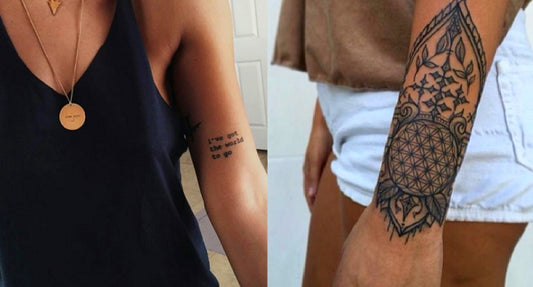
Can Coconut Oil Be Used on Tattoos?
The tattoo process doesn't end after you get a new piece of ink; you have to take care of it for the next few weeks. During this time, the skin heals from the trauma caused by the tattoo, so taking good care of your new tattoo is essential for it to heal and look as good as it did right after it was done.
During this process, it is important to apply a moisturizer of some kind to keep your healing skin supple. The oil is often recommended by tattoo artists and dermatologists, but many people are hesitant to use it due to its other uses (inside and out) and the fact that it is directly applied to the skin. Does it actually work as a skin moisturizer?
1. Coconut Oil and Tattoos: is It Safe?
No one is confused about coconut oil's safety when it comes to tattoos.
High levels of fatty acids in coconut oil help form a moisture barrier on the skin. In addition, coconut oil can soothe recently tattooed skin that is irritated, damaged, or inflamed due to its anti-inflammatory properties. The newly tattooed skin may feel slightly sore and even itchy as it heals. As a result of its anti-inflammatory properties, coconut oil may make the healing process more comfortable and reduce inflammation.
In addition to being safe for your tattoo, it is also beneficial. With high levels of lauric acid, it prevents bacterial growth, so tattoos can be protected from infection, it also reduces redness and inflammation, and it is rich in collagen, which helps tattoos heal quickly.
A tattoo healing process can be aided by coconut oil, which offers many health benefits. Natural preservative nutrients in coconut oil, for instance, can help protect the skin against microbial infections, which can put tattoos at risk. In addition to its antifungal properties, it can also help fight lipid-encapsulated viruses due to its fatty amino acid content. As it does not contain the potentially irritating ingredients used in tattoo products, there is very little risk of allergic reactions. As well as being great for older tattoos, it won't fade the ink, ensuring your tattoo looks vibrant and fresh for years to come.
2. How Does Coconut Oil Benefit Tattoos?
- An all-natural product
Because coconut oil is a natural product, it contains no irritants such as fragrances or chemicals. As all-natural ingredients don't react negatively with tattoos, you can rest assured it is a healthy and good choice for your skin. If you buy pure coconut oil, you know that no other ingredients have been added that could cause irritation or delay tattoo healing.

Coconut oil, however, should not be used if you are allergic to it. The biggest risk of applying coconut oil to a tattoo is persistent sensitization if you have an underlying allergy. If you are allergic to these ingredients, your skin may become more inflamed, the tattoo pigment can be destroyed, the color may be reduced or the tattoo pigment may migrate under your skin.
- Moisture is locked in by it
During the healing process, tattoos tend to dry out quickly, so using long-lasting and highly moisturizing products is important. The fatty acid profile of coconut oil aids in maintaining the moisture level of your skin. In addition to causing peeling and itching, dry tattoos can also ruin the overall design of a tattoo by disrupting the way it heals. Scabs can be gently exfoliated with coconut oil if you get itchy.
Due to its greasy nature, coconut oil may mess up your tattoo if you apply too much. It is important to pay attention to the amount and frequency of applications during the healing process.
Ink can be harder to penetrate if coconut oil is used too much on older, healed tattoos. The moisturizing properties of this product will make your skin look healthier and make any color in your tattoo (including black) really stand out. In addition, maintaining proper moisture after the tattoo heals, even after potential trauma to the skin, will extend the life of your tattoo.
Using this special oil on older tattoos only improves skin hydration. A fatty layer created by coconut oil locks in moisture and reduces the rate at which moisture evaporates from the skin. The pigment in a tattoo is better reflected on well-hydrated skin, allowing for a clearer view of its details.
Even after the tattoo heals, your skin will age better if you keep it moist. In spite of the fact that you may have gotten your tattoo years ago, you should continue to take care of it.
- It's good for the skin
Coconut oil has a number of benefits for your skin in addition to being good for tattoos. The petroleum jelly in topical antibiotics and petroleum jelly is missing from coconut oil. Unlike petroleum jelly, coconut oil rinses off easily and does not leave a film on the skin.
As part of the actual healing process, coconut oil can also be beneficial to the skin. Your skin becomes slightly swollen as it attempts to heal from the tattoo wound. The anti-inflammatory properties of coconut oil, including vitamins C, E, and L-arginine, as well as lauric acid, make it an excellent choice for treating this reaction. The clotting process of a wound is naturally triggered by vitamin K. The best way to achieve this property is to consume coconut oil, but applying it directly to the skin can also be beneficial.
3. Final Thoughts
With its moisturizing properties and vitamins that are good for your skin, coconut oil is safe to use on tattoos. You can keep your tattoo looking healthy and vibrant for years to come by using this natural, inexpensive method.










